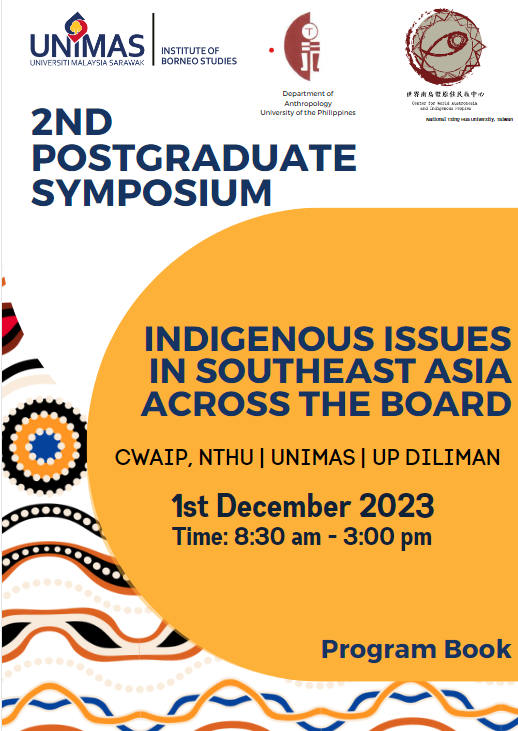
On December 1st 2023, the Institute of Borneo Studies of Unimas, the Centre for World Austronesia and Indigenous Peoples, National Tsing Hua University, Taiwan and the Department of Anthropology, University of Philippines, Diliman organised the 2nd Regional Postgraduate Symposium on Indigenous Issues Across the Board in Southeast Asia.
Spearheaded by the three entities in 2022, the forum is for graduate students to deliberate and interact with each other and share their current and prospective research on issues across the board pertain to indigenous peoples in Southeast Asia.
This is very momentous in the context or changing perceptions and attitudes towards the term – Indigenous Peoples. It is widely acknowledged that not long ago, none of the countries in Asia specially recognized the existence of and legally defined ‘Indigenous Peoples’. However, the concept is increasingly acknowledged, accepted and including as well as being legally recognized. Interest in indigenous issues, knowledge and interest is trending upwards as a research area in institutions of higher learning.
This symposium offers a platform for postgraduate students across the region to explore models, analytical frameworks and conceptual tools that define and shape the direction indigenous issues as a target field of inquiry within a specific field, and more so to build research capacity for collaborative and multidisciplinary approach to indigenous questions and issues in the region.
About 76 participants from 25 different universities and affiliations in and outside the region registered for the event. A notable academic who joined and actively participated in the online forum was Dr Alberto G. Gomes, Visiting Professor at University of the Philippines Baguio. The other academic was Dr Mary Jane Rodriquez, Assistant Professor at the Department of Filipino and Philippine University of Philippines Diliman. Equally important was the presence, and, contributions by Dr Asmus Rungby, a Research Fellow at Yale University.
Amongst topics and titles presented were Cultural Classification of Taiwan Indigenous Traditional Medical Knowledge by Aciang Iku-Silan from the Center for World Austronesia and Indigenous Peoples, National Tsing Hua Universality, Taiwan; Indigeneity and Sensory Experience: Care Practices and Resilience in the Frontiers of Kalimantan against the COVID-19 Pandemic by Anwar Basil Arifin from the Department of Anthropology, Universitas Indonesia, Indonesia; Disaster Memories of Ivatan Women: Narratives Before, During and After a Typhoon by Gladys Mae Z. Argonza Asian Center, University of the Philippines Diliman, Philippines; Learning New Stuffs: Preserving Indigenous Tradition in an Elderly Day Care Center by Chen Chongzheng from the Institute of Anthropology, National Tsing Hua University, Taiwan; Perceptions of Young Members of Aeta Community about their Intellectual Property Rights for their Traditional Knowledge Systems: Uniquely Magbukun by Juan Kristopier D. Angeles and Xyra M. Angeles of the Bataan Peninsula State University, Philippines; Communities Livelihood Transition Impacted by Bakun Hydropower Dam on Rajang River by Akram Akbari from the Institute of Borneo Studies, UNIMAS and The Datu, the Paramilitary, and the Local Government: Indigenous Leadership in the Shadow of the State by Maica Mae Lapuz from the Ateneo de Davao University, Davao City, Philippines.
Below are comments from some of the participants and Observers:
“Presenting in the symposium has been a great experience for my academic journey. The symposium became a platform in which intellectual exchange regarding issues about indigenous communities can flourish. Looking forward to the next symposium!” – Anwar, Universitas Indonesia.
“The symposium was a delightful collective exploration of contemporary issues in indigenous studies. The breadth of topics covered by the graduate students highlighted the complex and distinct challenges indigenous communities contend with and showed the importance of continued research in collaboration with indigenous groups. The comparative framing brought by juxtaposing cases from throughout the East & Southeast Asia region showcased the importance of locating a forum like this in the region. As the closing discussion exemplified there are still urgent and compelling theoretical questions and research concerns to explore in indigenous studies and the symposium proved an inspiring context for expanding these conversations” – Dr Asmus Rungby, Yale University .
“I am grateful that I get to send my abstract to the symposium as beyond presenting my research on the current Indigenous leadership adaptations in the areas in Mindanao, I get to open myself to what directions I should be moving in the future regarding Indigenous research. In addition, the comments and questions made me think about what weaknesses and ideas I must include in my research that I did not consider. Thus, I am thankful to the organizers of this symposium as I get to share knowledge, learn from the researchers, and be mentored on the direction to take.” – Maica Mae Lapuz, Ateneo de Davao University, Philippines